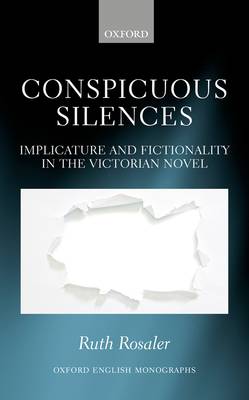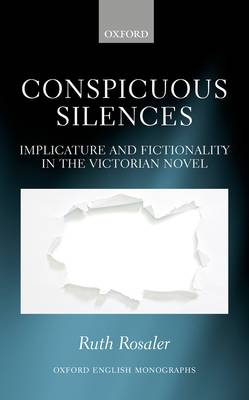
- Afhalen na 1 uur in een winkel met voorraad
- Gratis thuislevering in België vanaf € 30
- Ruim aanbod met 7 miljoen producten
- Afhalen na 1 uur in een winkel met voorraad
- Gratis thuislevering in België vanaf € 30
- Ruim aanbod met 7 miljoen producten
Zoeken
€ 156,95
+ 313 punten
Omschrijving
How are a reader's perceptions of a plot impacted by its presentation through textual clues rather than explicit narration and why would an author choose this comparatively indirect mode of narration? Conspicuous Silences answers these questions by examining Victorian novels in which pivotal events are left inexplicit for hundreds of pages at a time, but are nonetheless evident to the reader. The clarity with which readers understand these inexplicit plot lines is evidenced by their ability to follow the progression of narratives that rely heavily on the inexplicit content being detected; without this reader comprehension, these narratives would be deemed incoherent. In linguistics, communications that depend on a hearer's or reader's inference, rather on their "decoding" the explicit content of an utterance, are termed "implicatures." Conspicuous Silences explores the impact that central, sustained implicatures have on a reader's experience of a novel. It also discusses how
authors may generate those implicatures by exploiting the reader's assumption of narratorial omniscience, and the correlated reader assumption of a narrative's fictionality. Reliance on such sustained, fictionality-related implicatures is fairly ubiquitous: Conspicuous Silences concentrates on texts by Elizabeth Gaskell, George Eliot, Charles Dickens, Frances Trollope, Anthony Trollope, Wilkie Collins, and M. E. Braddon. It examines the use of implicature in communicating impolite topics, communicating character psychology, and in fashioning a playful narrative tone. This work contributes to Victorian literary scholarship, narratological discussions about narratorial omniscience and fictionality, and pragmatic stylistic debates about fictionality and the use of implicature.
authors may generate those implicatures by exploiting the reader's assumption of narratorial omniscience, and the correlated reader assumption of a narrative's fictionality. Reliance on such sustained, fictionality-related implicatures is fairly ubiquitous: Conspicuous Silences concentrates on texts by Elizabeth Gaskell, George Eliot, Charles Dickens, Frances Trollope, Anthony Trollope, Wilkie Collins, and M. E. Braddon. It examines the use of implicature in communicating impolite topics, communicating character psychology, and in fashioning a playful narrative tone. This work contributes to Victorian literary scholarship, narratological discussions about narratorial omniscience and fictionality, and pragmatic stylistic debates about fictionality and the use of implicature.
Specificaties
Betrokkenen
- Auteur(s):
- Uitgeverij:
Inhoud
- Aantal bladzijden:
- 208
- Taal:
- Engels
- Reeks:
Eigenschappen
- Productcode (EAN):
- 9780198769743
- Verschijningsdatum:
- 13/12/2016
- Uitvoering:
- Hardcover
- Formaat:
- Genaaid
- Afmetingen:
- 218 mm x 137 mm
- Gewicht:
- 362 g

Alleen bij Standaard Boekhandel
+ 313 punten op je klantenkaart van Standaard Boekhandel
Beoordelingen
We publiceren alleen reviews die voldoen aan de voorwaarden voor reviews. Bekijk onze voorwaarden voor reviews.











